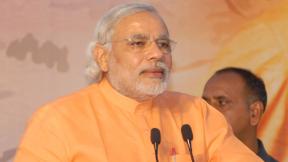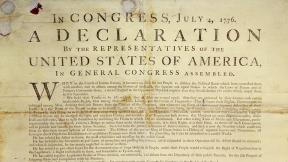
Like spiritual well-being and physical fitness, freedom and liberty are not static. A society's experience of liberty is a result of efforts by citizens to ensure its continuance.
Two hundred and thirty-nine years ago, in 1776, Thomas Jefferson and the signers of the Declaration of Independence asserted that all men were created equal and granted unalienable rights. However, a declaration means little on its own. It took six years of war with the superpower of the world at the time, Britain, along with seven years of conflict over taxes, as well as battles over the rights of states and individual liberties, before the constitution was ratified in 1789. That was with ten amendments to guarantee fundamental rights, including freedom of religion, speech, and press, the right to trial by jury, and other protections against government abuse of citizens.
Struggle lies at the heart of American liberty, and this struggle did not end with the Revolutionary War or the ratification of the Constitution.
In 1852, Frederick Douglas eloquently challenged the nation to live up to this ideal: "What to the American slave is your Fourth of July I answer, a day that reveals to him more than all other days of the year, the gross injustice and cruelty to which he is the constant victim. To him your celebration is a sham... your shouts of liberty and equality, hollow mockery."
After the Emancipation Proclamation, the nation continued to tolerate racism and hatred, but the civil rights movement shook our collective conscience, and forced our nation to correct its immoral course.
The post-Civil War pledge of allegiance, while embodying this struggle with "…liberty and justice for all," did not allow the Baptist minister Francis Bellamy to work in the words "equality and fraternity" as they were deemed too controversial. This was because many people still opposed equal rights for women and blacks.
Struggle Continued
Susan B. Anthony, Sojourner Truth, Bell Hooks, and the suffragists helped the nation expand our idea of equality to the right of women to participate in public life. Still later, the labor movement in the early part of the twentieth century and the civil rights movement helped the nation further question our collective immorality and to become a more equal place for everyone.
In our world as we face both real and imagined threats to our security, we are presented once again with a moral challenge. Will real threats, fear and ignorance allow America to reverse the progress of several centuries towards equality? Will secret evidence continue to rule? Will there be a Muslim exception to the first amendment. Will habeas corpus remain suspended? Will we compromise the very principles which give our nation its strength in order to achieve a semblance of peace? Will America uphold the noble principles enshrined in its founding documents? Or will the "pursuit of happiness" merely serve as the shallow pursuit of material comfort? Will we slowly allow our minds, hearts, and borders to be sealed?
In our nation's history of struggle, the people who were affected most by injustice took the responsibility of standing up for themselves. They readily found themselves surrounded by people of conscience who supported them.
It is the time for American Muslims to answer the call of destiny. It is their duty to dedicate themselves to meet the challenge of the American Dream as their prime responsibility.
It would be harmful to allow a feeling of siege and victimhood to paralyze us. We are neither haunted the way black America was haunted, nor we are detained the way Japanese-Americans were detained. Actually, it is thanks to their struggles that our mosques experienced neighbors knocking on our doors with open arms after 9/11. We owe it to America to continue that tradition of welcoming neighbors as well as strangers.
On this Independence Day, I invite fellow Muslims to liberate themselves from the box of material dreams, and commit to sacrifice for putting America back on its track.
Rose Wilder Lane of Little House on the Prairie fame, writes in her book “The Discovery of Freedom” about how the Prophet Muhammad’s struggle was the second most important struggle for freedom in this world. The followers of Muhammad owe him a fresh struggle for freedom. This would be one which can liberate their minds and hearts from slavery of all kinds, allowing them to contribute to humanity as they have done in the past. God’s peace and blessings be upon the Prophet.
The struggles of our past have shown that citizens have always moved America and the Ummah forward, whether it is the poor people’s movements in America, or the Arab Spring. However, nothing can be achieved without risks and the willingness to sacrifice.
"The Constitution is not an instrument for the government to restrain the people," said Patrick Henry, a leader of America's fight for independence, "it is an instrument for the people to restrain the government, lest it come to dominate our lives."
Let's resolve this Independence Day to be better Muslims, real neighbors, and good citizens.








Add new comment